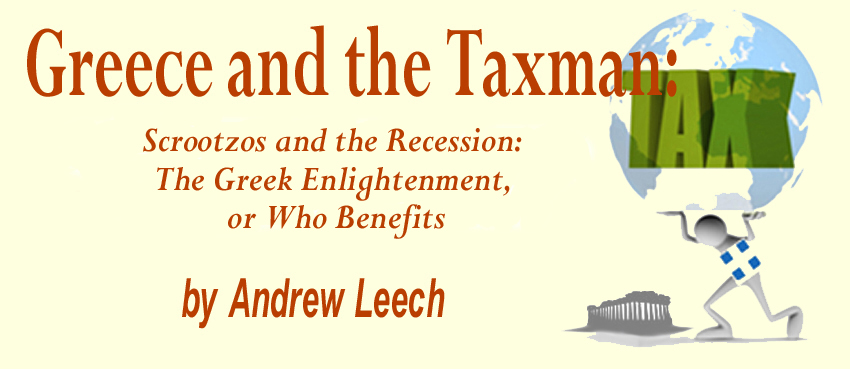 |
||
 |
||
|
(Part Three of three) (Previous installment: Part One, "Why the Greek Government Wants to Turn Us into Criminals") (Previous installment: Part Two, "Scrootzos--Christmas and the Greek Taxman")
|
||
|
Thank you, Mr Scrootzos. A lot of it is beyond me. But what I can’t really understand is who we owe all this money to. I know we have to repay to banks, but who lent all this money to the banks in the first place?” Now that is exactly what I would like to explain, because its answer is the heart of the total explanation. However, I’ll begin by telling you something about the USA first, although the principle of what I’m going to say equally applies to Greece, too. As you well know there are a good number of very rich people in the world; and as far as the USA is concerned these are about 1% of its population, or 2.9 million people. The IRS (the US Tax Department) calls those with a share portfolio of over $30 million ‘Ultra High Net Worth Individuals’ (UHNWI) and their total invested assets – that means shares and bonds only, not counting houses, cars or businesses – is about $12.9 trillion. |
||
Now, as you probably know, politicians in any democratic country need votes to continue having a sweet life. They also need money to run the country and give them toys to play with; but voters don’t like taxes and that causes politicians a headache. If they tax the poor and average citizens they get riots and general social upset which gives them a lot of unwanted work … plus, of course, they lose votes. But if they tax the rich they get even more headaches and the rich really know how to make life difficult for them in places where it hurts, like their social lives and bank balances. So the only way to get an easy life, but yet run the country on grand schemes which make these politicians seem to be great guys that people want to vote for, is to tax as little as possible … and borrow the rest. So, average citizens are only taxed as much as they can comfortably bear – not till the pips squeak – and the government turns to the rich for the rest.” But, Mr Scrootzos, isn’t that right. Shouldn’t the rich pay more than the others?” Ah, Bobbos, that is true, but life doesn’t work like that. The rich don’t like being taxed either and, remember, they really know how to make politician’s lives difficult if they want to. So the government resorts to a compromise. It doesn’t tax the rich; instead it borrows the money it needs from them. That way the rich get a financial return on their money and don’t pay too much tax, the government gets the money it needs to run the country and Mr & Mrs Average voter are not unduly squeezed and likely to move their vote to another party! The poor don’t really know what is happening behind closed doors, but they are not being taxed so they don’t care. The rich are equally happy at not being taxed and get the added bonus of lending back to the Government what they might have paid in taxes, so they win both ways. You see, a deficit, in many ways, is a service to the rich. And now the problem is solved for the present and the politicians can get on with their lives. Remember, too, that politicians only think in 4 year chunks; by the time the money needs to be repaid another party might be in charge … and then they will have the problem of dealing with it!” So, why can’t they just keep on borrowing if the rich are willing to lend it?” |
||
Well, Bobbos, there is a limit to lending; and this limit was reached when someone pointed out that the borrowing had reached such a high level that, perhaps, a government might not be able to repay it. So the rich and the banks became leery of lending any more. The financial tap was cut off and politicians had to start looking to other sources to make up for the financial deficits. In other words, Mr & Mrs Average had to start being really squeezed until the pips squeaked! |
|
|
|
|
||
|
(Posting date 21 January 2011) HCS encourages readers to view other articles and releases in our permanent, extensive archives at the URL http://www.helleniccomserve.com/contents.html. To read more fine articles by Andrew Leech, see our special archives section devoted to his works at the URL http://www.helleniccomserve.com/archiveleech.html . For more information about the author, see his short biographical sketch at the URL http://www.helleniccomserve.com/andrewleechbio.html . |
||
|
||
|
2000 © Hellenic Communication Service, L.L.C. All Rights Reserved.
http://www.HellenicComServe.com |
||
